A Guide to Toddler Development and How You Can Relish It
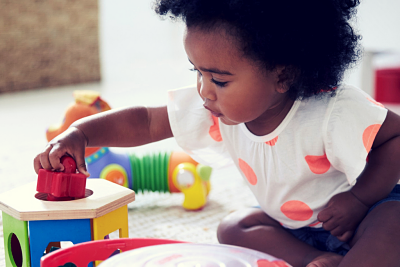
The first year of babyhood is over. At times it will have whizzed by and at other times (during the middle of yet another sleepless night) it will have seemed like it was lasting forever.
However, now you’re entering a totally new stage: that of the toddler years. Toddler development is rapid and varied but full of ‘wow’ moments and fleeting treasures.
Here we take a look at the toddler development milestones, what you can expect and, more importantly, how you can relish it.

Toddler development is intense. They are learning and changing in so many ways: physically, emotionally, socially and through language. You’ll often feel the goalposts are shifting just as you’ve got the hang of things. This is totally normal!
It’s also normal that different children reach their milestones at different ages. There is no average toddler. They are all unique. Even if your child takes longer reaching their toddler development milestones than their baby group peers or their older siblings, this doesn’t mean they won’t catch up.
You can find more detailed information on specific toddler development milestones at Baby Centre UK. Remember these milestones are often met over a period of months. If you’re concerned about your toddler’s development then do chat with your Health Visitor or GP.
Let’s take a look at the main toddler milestones. This is a stage of magical wonder, so get ready for the ride.
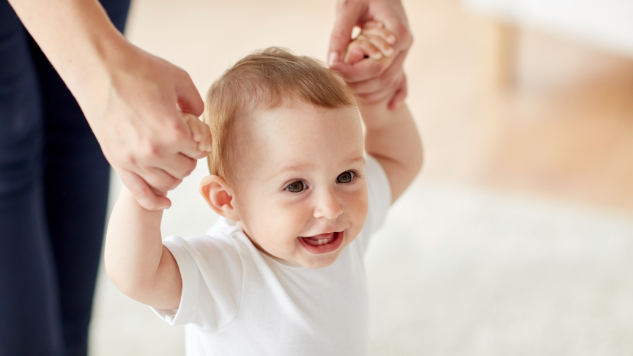
1. Watch out world, he’s on the move!
You may have had an early walker, or this stage may still be ahead of you. At some point, usually between 10 and 18 months, your little one will take their first steps. Even when your baby was crawling or bottom shuffling, you won’t have been prepared for the sheer madness that’s coming your way!
Everything needs to go up a level, from the books on the shelf to the speed at which you can dash after them.
Very rarely this happens overnight. You’ll likely know it’s on the horizon and be anticipating those first steps. However, walking – and its real mastery - takes considerable muscle strength and growing coordination.
Also in the toddler years, you’ll see other boosts in physical development. Once walking is mastered, they are likely to move on to throwing, kicking balls, building blocks, and feeding themselves with a little more coordination. They will also start to make marks as a precursor to writing.
How to relish this milestone:
Be ready with the video camera for this stage. You’re unlikely to capture the very first steps as you’ll likely be waiting with open arms, but get it on film when you can. You’ll look back on those first few toddles and gush every time.
Also plan plenty of trips where your little one can freely be allowed out of the pushchair safely. Parks in dry weather are an ideal training ground for little movers.
Take care to offer cuddles and reassurance but don’t panic when the bumps and bruises come – it’s all part of learning. Follow your child’s lead and gently encourage greater physical independence from their use of a spoon and cutlery, to where they explore at the park.

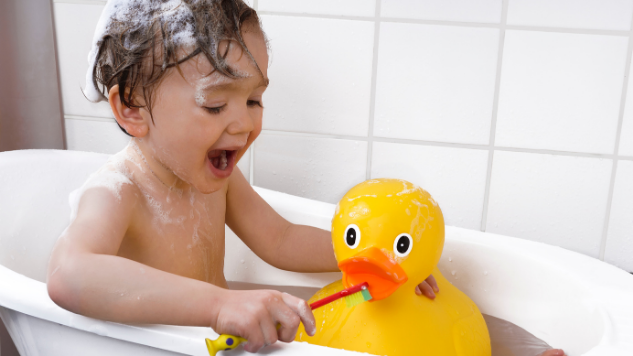
2. Get ready to listen!
The toddler years are a real joy and wonder as their language develops and you’re able to gain closer insight into their understanding of the world and what fascinates them.
From around 12 months, your toddler should be able to recognise their name. This is met with their first attempts at words, usually between 12 and 18 months. Don’t expect perfect enunciation from the start. In fact, you may be the only person who can understand your toddler for a while.
Understanding language comes before a toddler’s ability to use it. Therefore don’t underestimate their ability to understand far more than they can say.
By the age of around 2 years, your toddler should be able to start stringing simple sentences together. By 3-4 years, they should be much more confident in their language and using sentences well and clearly. If at this stage you have concerns, then speak to your Health Visitor. Speech and Language Therapy can be immensely powerful when started young.
How to relish this milestone:
Get ready with a pen and notebook to record your toddler’s first words. Throughout their childhood they will love hearing from you what they said and when, so you’ll need to know!
Use the development of language milestone as an opportunity to begin role play with your child. Now’s the time for tea parties, pretend phone calls, and pretend teddy doctors!
A wonderful way to relish this period of toddler development is to share books often. You’ll soon have your favourites which can one day move into the memory boxes for you to reflect on when they’d rather read ‘Horrid Henry’ than ‘How Much Do I Love You’.
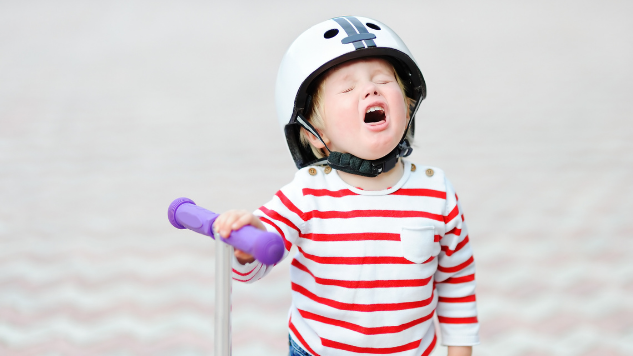
3. Watch out for those big emotions
Little people come with big emotions. This is all a normal part of their toddler development. They are entering the realm of needing to learn right from wrong and moving away from an egocentric view of the world. With this comes frustration and confusion. Add tiredness or hunger into the mix and you’ve got a ripe combo for a tantrum.
Someone was lying when they coined the phrase ‘terrible twos’. In reality, these are moments interweaving the whole toddler years. Yet they are just ‘moments’ (even if that happens to be a 30 minute ‘moment’ in the supermarket).
(Find out more: Blog - How to Manage Toddler Tantrums and Tips to Make Them Less Frequent)
You’re also likely to encounter a tricky stage of separation anxiety. Realising they are separate from you is a tough and bewildering stage to go through. You may feel they are once again attached to you with Velcro.
(Find out more: Blog - How to Overcome Separation Anxiety in Young Children)
How to relish this milestone:
No one is expecting you to relish a tantrum! However, realising that your little one is gaining independence of thought, even if wrapped up with strong will, is a wonderful moment. These are their first steps to being an individual.
It will help you to relish this milestone if you can channel every ounce of patience you can muster. Make sure hunger and tiredness don’t get footholds and reassert the boundaries in a calm but firm way. Try to remember: this is normal, and it will pass.

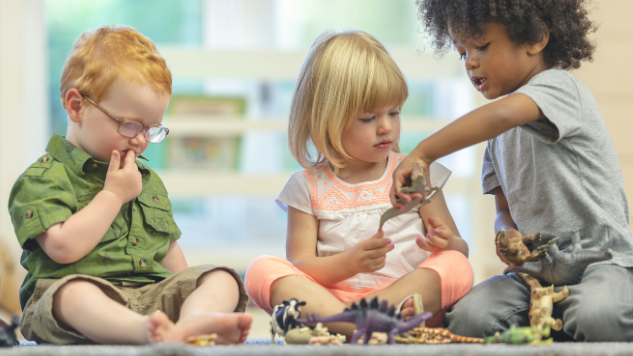
4. We’re looking outwards to peers now
As the toddler years get underway, their social development will be booming. Socialisation is absolutely critical for us as human beings, and now your little one can walk around, they are gaining more control over their ‘own’ social interactions.
This is all new and some toddlers find this easier than others. Some are natural born mediators ready to share with a smile. Others are more likely to assert their wants with a swift thump or even a bite. Be on hand to demonstrate and guide them as they build their first peer relationships.
At 2 or 3 they’ll have the opportunity to practice these skills at preschool as they begin to move completely away from parallel play (playing alongside each other) to fully associating with one another in role-play and more complex interactive games.
How to relish this milestone:
This stage of toddler development can be both incredible and anxiety-inducing. You’re gaining insight into the person your child is becoming, but you are also likely realising they sometimes have a ‘less than perfect’ side too.
Remember, social interaction can be tough and lashing out at peers is not unusual. Remain calm, stay near, and help by praising positive play. Enjoy this time for when you can meet with friends and their toddlers and really start to explore the world together.
Take photos of them with their little buddies, as it’ll be wonderful to compare them to photos taken years down the line.
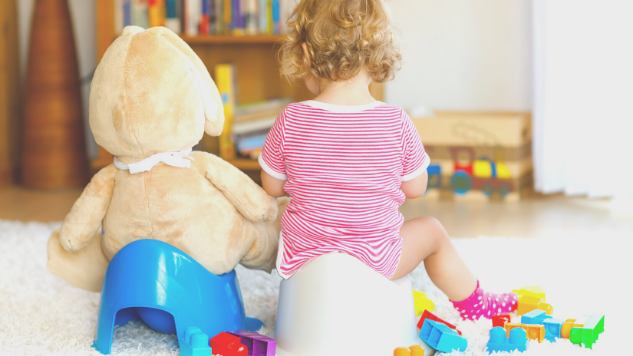
5. Time to take the potty with you
A huge milestone for toddlers is, of course, saying goodbye to nappies and hello to pants. The window for this stage of toddler development is wide-ranging, from 18 months to around 4 years. Night time continence generally takes longer and isn’t necessarily connected to daytime control. It can take until around age 7 for a child to consistently be dry at night.
You’ll need to keep an eye out for when your little one is starting to gain bladder control. They may be able to communicate when they are wet or dirty. Or you may see them actively stop what they are doing to pee. They may also take themselves to a favourite spot!
You will soon discover that there are several different approaches to potty training. Be confident and choose the right approach for you and your child. No one will remember by the time they start school what age they were out of nappies!
How to relish this milestone:
Get your young toddler used to the familiarity of a potty or child’s toilet seat by having it around and letting them sit on it at bath time. Make it a fun time with praise and reward. When they are ready, you’ll enjoy being able to choose some teeny pants, and of course being able to say farewell to nappy changes!
The toddler years can go by in a blur. Toddler development is an amazing process to witness. You’ll find you’re getting a view into the person they will one day be. By the time these years are through you’ll have a raft of incredible memories that will last a lifetime. As your child reaches his toddler development milestones be sure to be there as their fiercest cheerleader.
We believe your little ones deserve the very best care. That's why our local network of babysitters are personally checked and picked by our family for your family www.sitters.co.uk.
